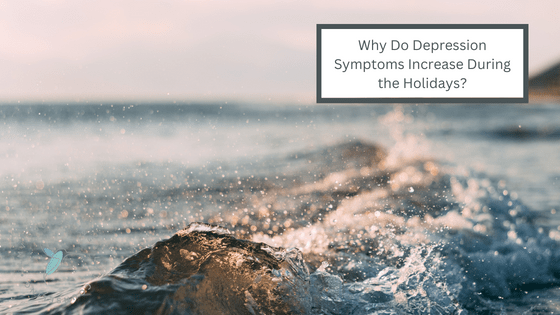The holiday season, depending on whom you ask, starts with Halloween and ends with New Year’s Day. Throughout these months, there are dozens of traditional holidays across religions, countries, and cultures. In theory, it should truly be the most wonderful time of the year. It seems like everyone has a reason to celebrate, but for those who struggle with depression, the holiday season frequently triggers an increase in depression symptoms. In this blog, we’ll talk about why as well as offering tips to overcome increasing depression symptoms during the holidays.
Why Do We Feel More Depressed During the Holidays?
There are many reasons why depression symptoms can increase around the holidays, including:
- Seasonal depression – during the colder, darker days of winter, people often experience a spike in depression symptoms. This can coincide with the holiday season.
- Stress – added stress of gifting, cooking, attending events, and the other things that come with the holidays can make feelings of depression more severe.
- Grief – whether you’ve lost a loved one recently or years ago, the holidays can trigger sadness and depression related to this loss as reminders of
 the loved one can seem to be everywhere.
the loved one can seem to be everywhere. - FOMO – worry about missing out on experiences can be really overwhelming and exhausting, which increases risk for depression symptoms.
How Can We Cope with Holiday Depression?
The good news is that the holiday seasons is filled with activities and interactions with loved ones that can improve depression symptoms, but that doesn’t always mean we’ll avoid these symptoms entirely. Some tips for managing depression symptoms during the holidays include:
- Start with self-care. Every day, you should be getting enough sleep, eating a nutrient rich diet, staying hydrated, exercising, and maintaining your hygiene routine. This is the bare minimum but committing to and maintaining your daily self-care can significantly improve mood.
- Don’t create unrealistic expectations for yourself, your loved ones, or the holidays in general. Many people say their depression spikes at the holidays because they’re not as much fun or as exciting as they used to be. Refocus your attention on the loving relationships and joyful experiences happening now rather than expecting them to be like the past.
- You can say no. You don’t need to go to every event. You don’t have to exhaust yourself to enjoy the holiday season. Do the things that matter to you, but if you don’t have time for an event, give yourself permission to skip it.
- Reduce holiday pressures. Limit or forego social media during the holidays. You can also talk to family and loved ones about gifting if the financial aspect of the holidays is especially stressful. Do anything that will help you feel less overwhelmed by pressure to enjoy the holidays.
- Use alcohol and other substances responsibly. It can be fun to overindulge at the holidays, but drinking and using other substances can also increase depression symptoms.
 What Can We Do for Loved Ones Who Struggle with Holiday Depression?
What Can We Do for Loved Ones Who Struggle with Holiday Depression?
The number one way you can support loved ones who struggle with depression at the holidays is to listen to them and validate their feelings. Many people struggling with depression feel as though no one understands what they’re going through or cares. By listening and being supportive of their emotions and experiences, you help them to feel less isolated by their depression. Don’t offer too many recommendations. It may seem helpful to say things like “Go out and have fun,” or “Maybe you should spend more time with other people.” However, these types of suggestions can make a depressed person feel guilty or ashamed of themselves because they can’t just work harder and feel less depressed. Instead of making suggestions, ask them what helps them feel better. The one suggestion you can make is for them to visit with a professional. Make sure they understand that you love them and will do everything you can to support them, but there are people who are more qualified to help them with their struggles.
Can Therapy Help?
Therapy is an important resource for people who are experiencing depression symptoms. During therapy sessions, you can work alongside a trusted professional to better understand the underlying sources of depression symptoms and develop healthy, safe, and effective strategies for coping with symptoms of depression. If you want to work with the LMV Counseling team or complete our online scheduling request form.

